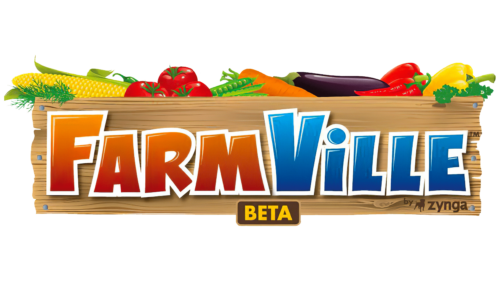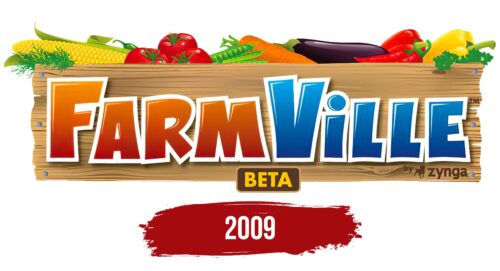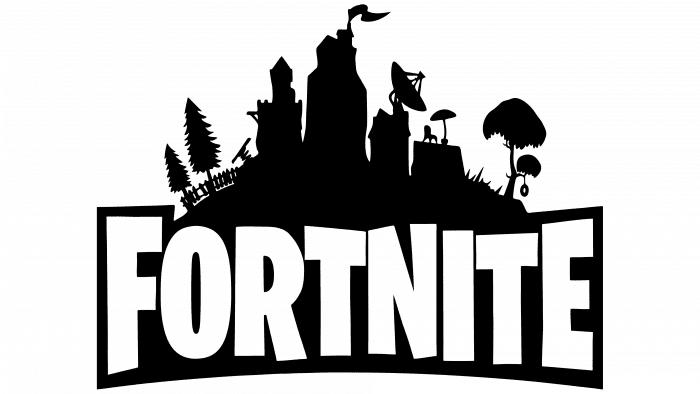The Farmville logo serves as a visual representation of the game’s concept and gameplay. It communicates the immersive and rewarding experience of tending to crops, growing a thriving farm, and harvesting a bountiful yield. The combination of the wooden crate, vibrant vegetables, and distinct font conveys a sense of nature, freshness, and the joy of cultivating a successful farm in the virtual world of Farmville.
The Farmville logo has been meticulously designed to capture the essence of the game. At its center, there is a wooden crate brimming with lush greenery and vegetables. The artists have skillfully depicted various vegetables, including corn, carrots, dill, peas, tomatoes, eggplant, hot peppers, and bell peppers, in a realistic and detailed manner. On the side of the crate, like a signboard, the name of the video game is prominently displayed. A rough, angular font has been specifically created for this emblem, with all letters in uppercase. The letters “F” and “V” are enlarged for added emphasis. To create contrast, the first half of the word is rendered in brown, while the second half is in blue.
The Farmville emblem perfectly encapsulates the core essence of the game, which revolves around farming and agriculture. The depiction of a wooden crate overflowing with a variety of fresh produce symbolizes the fertile and abundant nature of the farming experience in the game. Each vegetable is meticulously illustrated, showcasing the attention to detail and realism that players can expect. The rustic and rough font choice further enhances the logo’s connection to the farming theme, evoking a sense of authenticity and down-to-earth charm.
Farmville: Brand overview
| Founded: | 2009 |
| Founder: | Zynga |
| Headquarters: | United States |
| Website: | zynga.com |
In the year 2009, Zynga, a trailblazing social gaming company, unveiled an innovative game that would subsequently mesmerize millions of global players. This game was the phenomenal Farmville, destined to become a sensation across the continents.
Farmville provided players with the intriguing premise of experiencing the life of a virtual farmer. Players got the chance to cultivate crops, nurture livestock, and erect their very own farmstead from scratch. This digital simulation promptly gained global popularity, attracting millions of gamers from all corners of the globe.
The irresistible allure of Farmville can be attributed largely to its straightforward accessibility. As an integral part of the immensely popular Facebook platform, players could readily connect with friends and invite them to partake in the joys of their virtual farms. This led to the formation of a bustling community around the game.
Zynga’s dedication to perpetually rejuvenating Farmville with fresh crops, various animals, and novel architectural elements kept players perennially invested in the game. These regular updates preserved the game’s freshness and excitement, which was instrumental in driving its monumental success.
Over time, Farmville rapidly ascended to become a cultural tour de force, amassing a horde of devoted fans and prompting an array of spin-off merchandise. Its success instigated a wave of social farming games, and soon, a host of imitators emerged on the digital landscape.
Though Farmville may not currently command the ubiquitous gaming presence it once did, its impact on the industry is irrefutable. It redefined our perception of social gaming, showcasing that such games could captivate audiences just as effectively as their traditional counterparts. The legacy of Farmville has catalyzed a renewed interest in the genre, with many successful titles following its groundbreaking path.
Meaning and History
The brand identity of this groundbreaking game series is intrinsically connected to the ideas of simplicity, community, and tranquility. As a game centered around rural life, it promises a peaceful and relaxing atmosphere where players can take a break from the hustle and bustle of daily life. This promise is maintained across the series, allowing the brand to become synonymous with easy-going and rewarding social gaming.
The visual branding of the game series aligns perfectly with the serene and friendly atmosphere it promotes. Its distinctive and vibrant artwork, featuring picturesque farms, cuddly animals, and bountiful crops, creates an instantly recognizable and cohesive aesthetic. This captivating design language consistently reinforces the brand’s identity as a source of relaxing, engaging gameplay.
Another integral aspect of the brand’s identity lies in its emphasis on social interaction. The series encourages cooperative play and meaningful interactions, cultivating a sense of community among its players. This commitment to fostering social connections has differentiated it from other games and reinforced its brand identity as a fun, shared experience. The result is a strong and enduring brand, as charming and inviting as the virtual farms it allows players to cultivate.
What is Farmville?
Farmville, an agriculture-simulation social network game series, was launched in 2009 by its developer and publisher, Zynga. This innovative gaming experience rapidly became a cultural phenomenon, making its mark on the nascent social gaming scene and winning over players globally.
In its early days, the game’s premise was straightforward yet compelling—manage a virtual farm, care for crops and animals, and share this experience with friends. Simplicity was key, and the friendly, accessible nature of the gameplay resulted in a wide-reaching popularity that spanned various demographics. As a trailblazer among social network games, the influence of this series extended far beyond its platform, shaping the future of social gaming.
The Farmville logo perfectly encapsulates the spirit of the game it represents. The center of the logo is dominated by a wooden crate filled to the brim with a variety of realistically drawn vegetables, symbolizing the game’s focus on farming and cultivation. The game’s title, written on the side of the crate, employs a unique, jagged font that fits well with the game’s rustic and rural atmosphere. The letters ‘F’ and ‘V’ are enlarged for emphasis, and the color shift from brown to blue in the title offers a pleasing contrast, further enhancing the logo’s visual appeal.
Farmville color codes
| Lapis Lazuli | Hex color: | #005ca2 |
|---|---|---|
| RGB: | 0 92 162 | |
| CMYK: | 100 43 0 36 | |
| Pantone: | PMS 2945 C |
| Rust | Hex color: | #bd4116 |
|---|---|---|
| RGB: | 189 65 22 | |
| CMYK: | 0 66 88 26 | |
| Pantone: | PMS 1665 C |
| Dark Brown | Hex color: | #543526 |
|---|---|---|
| RGB: | 84 53 38 | |
| CMYK: | 0 37 55 67 | |
| Pantone: | PMS 4695 C |
| Selective Yellow | Hex color: | #fdb900 |
|---|---|---|
| RGB: | 253 185 0 | |
| CMYK: | 0 27 100 1 | |
| Pantone: | PMS 7549 C |




